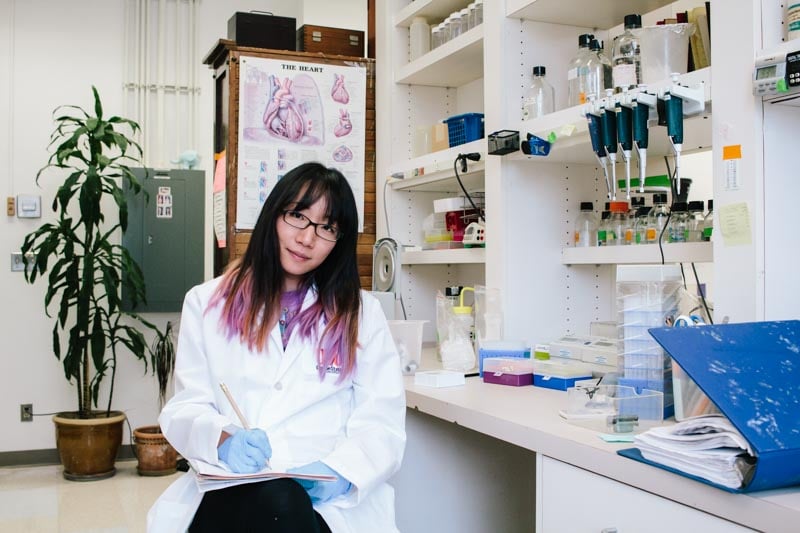While we’re focused on several exciting new features in the pipeline, it's a priority to constantly engage with our users to understand their thoughts about BenchSci.
For our second case study (here's the first), I had the pleasure of connecting with Vera C. Lattier from Oregon State University. Read on to see how BenchSci has helped her find the antibodies she needs to discover the molecular mechanisms of congenital myopathies.

Researcher: Vera C. Lattier, PhD Candidate, Oregon State University
Vera C. Lattier is a PhD candidate at Oregon State University. Her research focuses on investigating molecular and cellular mechanisms of skeletal muscle maintenance, as well as how skeletal muscle regulates the metabolism of the body. Outside the lab, Lattier enjoys photography and cooking a fusion of cuisines including American, Chinese, and Greek.
Research: Gene Therapy Targets for Congenital Myopathies
Skeletal muscle is a highly complex organ. Most congenital myopathies often lead to metabolic diseases, such as obesity and type 2 diabetes. Genetic therapies are one way to cure the myopathies. Thus, looking for genetic therapy targets and understanding the mechanisms causing metabolic changes are crucial. Lattier investigates the molecular mechanisms as well as the transcriptional profile of transgenic mice in order to discover the genetic markers for therapy. “A huge part of my work is done in various immunoassays” she says. “It is pertinent for me to work with antibodies with high specificity.”
Challenge: Volume and Variability
The most challenging aspect of antibody search for Lattier is the volume and variability of antibodies. “I use common markers for my work, thus I have several options of antibodies to purchase from,” she says. “This makes choosing an optimal antibody very difficult, as the quality and the specific assay for an antibody varies. I would have to search through numerous publications to find a promising one.”
An Unnecessary Burden
While literature review is critical for validating results and planning future experiments, sifting through papers to find antibodies can hinder research output. “The literature search is very time-consuming because there are often hundreds of papers available on a given biomarker,” Lattier says. “However, it is a process that I have to go through every time when searching for an antibody that applies to specific assays. An unsuccessful experiment caused by the wrong antibody will cost my precious sample, which takes a long time to collect.”
What makes the process even more frustrating is that antibody information is often only partially cited in papers, Lattier says. “Only a subset of papers list the catalog number and vendor name,” she says. “I would have to find the correct lot number or clone of a particular antibody.” This translates into hours to days spent on antibody search, since not all papers she reads contain the information she needs to pinpoint an exact antibody.
Solution: Data Curation and Complete Reporting
To help with her antibody search, Lattier has tried several databases for commercial antibodies, but she didn’t find them particularly useful. “Most provide incomplete information on how antibodies were used in the literature, and for databases that listed papers, I still had to go through each paper to find one that matches my desired experimental setup,” she says.
Pinpoint Most Relevant Papers
On the other hand, she found viewing published figures directly on BenchSci, filtered by specific contexts, to be very useful. “It saves me a lot of time when I can just review the methods section of relevant papers,” Lattier says. It took her about 10 minutes to find the antibody that is working in her current experiment, while it normally would take her at least a full day. What’s most important to her, she says, is the time and sample that she can save from not repeating a failed experiment. “It liberates me to do more experiments,” she says.
“It saves me a lot of time when I can just review the methods section of relevant papers”
A Community-Wide Effort
While Lattier thinks BenchSci would help many biomedical researchers, she also acknowledges that it would be only as good as the completeness of antibody information cited by scientists in publications. “It fundamentally comes down to a collective effort by all scientists to succinctly report the use of antibodies,” she says. “This includes the full catalog number, vendor, and lot number or clone.”
Lattier has been using BenchSci on a regular basis for her antibody search. “The need to register may be a bit inconvenient,” she says. “But I’m glad I gave it a try, or else I would’ve missed a great resource for my project.”

